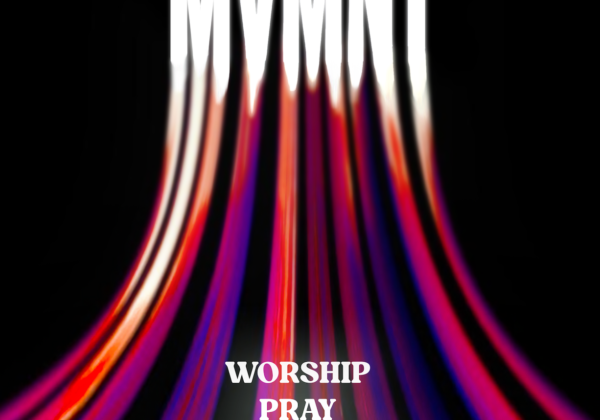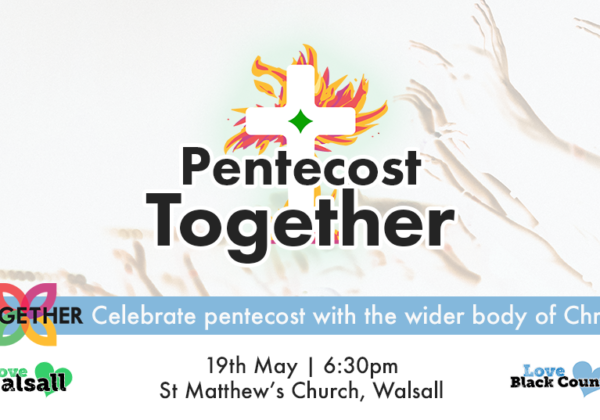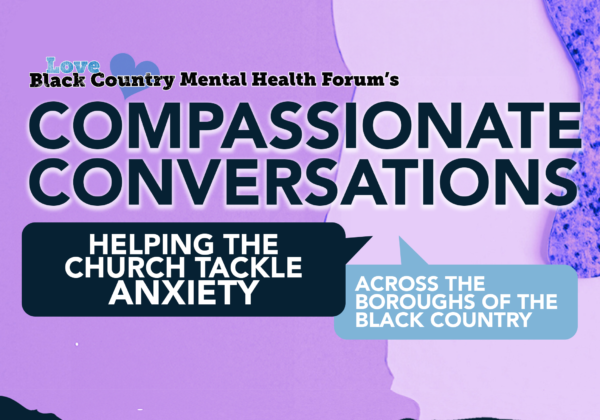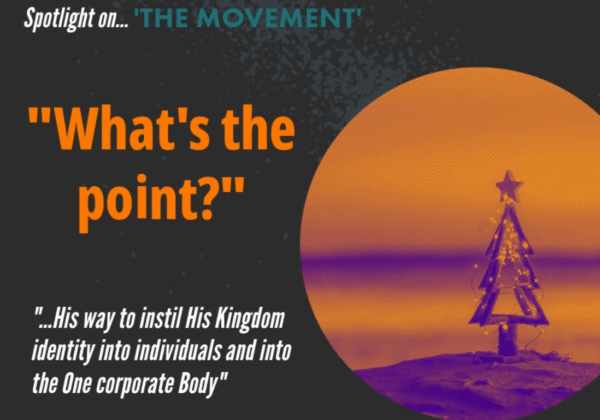
Silence in the Easter story (and what it may say to churches in a lock down)
This week, we welcome David Faulkner as a guest writer. David is an Elder at Amblecote Christian Centre in Stourbridge.
Over this Easter period I read again the gospel accounts of the events of Good Friday. Familiar but holy ground. It was in Matthew 27 in particular that I was struck by a theme woven into the narrative that at first sight may seem like something of a side-story, but which in fact ties together a number of strands into the fabric of the essential message of Easter. I saw, or heard, or as it might have been, felt, the silence of the Easter story.
I am a newcomer to silence. It’s true that I’m naturally introverted, someone who draws strength from time on his own; I’m reflective, an internal processor rather than someone who likes to talk things out in big debates. But that’s the interesting thing. It’s not just extroverts and talkative folk who struggle with silence. Call it busyness, distraction or whatever, but internally I am almost never silent. And from what I observe, that’s true of most people. We have so much to say, so much we want others to hear. The world, our world, is so noisy.
It might have been thought that enforced lockdown for a few months would change all that. Much less travelling for most, less work for some – it ought to be a recipe for a quieter life. But actually, it seems to me the world just got noisier! Don’t get me wrong. Connecting for conversation with family, friends, neighbours, through all the means that modern technology wonderfully affords, is a great gift, particularly for those who would otherwise be isolated in the fullest sense of that word at this time. But the explosion of chat and opinion, banter and speculation, newsfeeds and trivia over the first few weeks of life in lockdown makes silence if anything an even rarer commodity than it was before.
And to add to the noise, many believers are asking what the Spirit of God is saying to His church. Surely, He must have something to say at a time when the world we have become used to has changed seismically in the space of less than a month, change that in many ways looks likely to be permanent. Surely God has something to say about it all. But I wonder if most of us are so busy talking – externally, internally, to each other and even to God Himself – that we couldn’t possibly know.
It’s striking therefore that silence is at the heart of the central narrative of the Christian faith. For those of us used to noisy lives, it is a silence that is profoundly disturbing; yet if we would but embrace it, it is a silence which is also profoundly healing.
First, there is the silence of Jesus.
Read any of the Easter narratives, and it’s not difficult to see that Jesus had every reason to speak. We know of course that His suffering was utterly unique; it had particular divine, world-changing purpose. But often we read the Easter narratives without ever considering what it would have been like to be in Jesus’ place. In other words, we miss the thoroughly human element of the drama. In order to enter into the Easter story more fully, try reading Matthew 27 more subjectively by asking what feelings would have been conjured up in you if you had experienced any or all of the suffering which rained down upon Jesus on the first Good Friday:
- multiple false accusations (v. 12 – 14)
- total injustice and unfairness (v. 15 – 23)
- humiliation and mockery (v. 27 – 31)
- theft (v. 35)
- a ruined reputation (v. 38)
- complete misunderstanding (v. 40)
- an attack on your identity (v. 40b – 42)
- a verdict that even God doesn’t value you (v. 43)
Pausing over even one of these experiences, which for some people are all too real, may evoke a whole range of emotional responses. But for many of us, foremost among them is the almost uncontrollable desire to say something: to challenge the accusations and injustice; to fight back against the humiliation; to protest the theft; to put right the ruined reputation and misunderstanding; to assert our identity.
But what is Jesus’ response as He goes on trial? Silence. In Luke and John, we see a few more words recorded, but in Matthew Jesus speaks only once and even then it is the briefest of responses to Pilate’s question, “‘Are you the King of the Jews?’”. He answers simply, “‘You have said so’” (v. 11). Otherwise, as He is set on a path to execution, Matthew portrays a silent Christ. So much so (as Mark and Luke also record), Pilate is “greatly amazed” (v. 14). “He was oppressed and afflicted, yet He opened not His mouth” (Isaiah 53 v. 7).
When Jesus speaks again, more than six hours later, His suffering has reached its unimaginable height and in verse 46 He cries out with a loud voice – a cry from the depths of His soul, uttered with all of the strength He is able to muster – “‘My God, my God, why have you forsaken me?’”.
And so we come to the second silence in the Easter narrative: the silence of God.
There is no answer from the Father.
There is no life-affirming, loving declaration, “‘This is my Son in whom I am well pleased’”.
There is no rending of the heavens.
There is simply silence …
Matthew’s final record of Jesus’ crying out from the Cross is in verse 50: “And Jesus cried out again with a loud voice and yielded up His spirit”. Matthew does not even tell us what Jesus said. Maybe because the cry was wordless, an inarticulate, guttural cry that words could not express. And once again, there is no answer.
The silence of God.
There is one final silence in Matthew 27 that may not be quite so clear on first reading. On Friday Jesus suffers, dies and is buried. On Sunday morning, gloriously He is raised from death. But there is no record of Saturday. With holy imagination, we might fill in some of the gaps of what the disciples experienced on that day. But the gospel-writers themselves record nothing. In the middle of the most important events the world has ever known, the record of history is silent.
A silent Christ, a silent God, a silent world.
Why do most of us run from silence? In a period of lockdown, some of us may experience occasional silence externally, when the TV is off and our phone has stopped buzzing, but why do we find the idea of internal silence unbearable, even unimaginable?
As a newcomer to silence, I would have to defer to those more well-considered than me for more developed reflections. But from my simple observations of myself, and to some extent from my observations of others, I have noticed three main reasons.
The first is that we are afraid. We are afraid of what we might discover about ourselves when all of the noise finally stops. We avoid looking too deeply within because we are afraid of the nakedness of our own soul. We find the noise so comforting because it helps to keep that awful prospect at arm’s length.
The second reason is that we want answers. And we want them quickly. Of course, there are vital practical questions to be answered during the pandemic, particularly at the governmental level (how to defeat the virus, how to equip health workers, how to protect jobs, how to construct an exit strategy). But we are not yet a month into lockdown and already we have more answers than we can cope with, filling our WhatsApp, Facebook and email accounts and overwhelming our already-overactive minds. Whether it’s steps to surviving/prospering in lockdown, what the church should and shouldn’t be doing, or the meaning of the coronavirus (“God is judging (or ending) the world”, “we are on the verge of revival”, and everything in between), we are desperate for answers.
The third reason is that we want to justify ourselves. Whether before God or before other people, most of us have an irresistible urge to explain ourselves. Particularly when we feel misunderstood, we find a plentiful supply of words ready to force their way out of our mouths from somewhere deep within. But even in everyday conversation the same experience can be observed – we want to be heard, we want our views to count, we want to be noticed. We have to justify ourselves.
How does the message of Easter speak to and soothe those longings? Wonderfully and completely.
We are afraid to look within, but that is precisely where Easter is meant to take us. If we behold the suffering of Jesus, not passing it by as an all too familiar scene, but dwelling there to truly take it in, we cannot help but be confronted by the depths of our lostness, our brokenness, our sin – and not ours alone, but the lostness, brokenness and sin of the world. The Cross doesn’t spare us the horror of our individual and collective sinfulness as we see what it did to Jesus. And yet of course it precisely does spare us, because the Cross takes us beyond the experience of looking within. It calls us to look beyond ourselves to the unspeakable suffering endured by the innocent Christ whose suffering was in a myriad of ways for us and for our world.
We are desperate for ready-made answers to our questions. But on Good Friday, and on Easter Saturday, we are presented with an all-too silent Jesus, and an all-too silent God. Even on Easter Sunday, there still seem to be fewer answers than we would like. Why doesn’t Jesus now show Himself to the world (John 14 v. 22)? Why does He seem to be unable (or as is more likely the case, unwilling) to persuade all of His followers that He is the resurrected Lord of the world (Matthew 28 v. 17)? Why does He disguise Himself even from those who love Him the most (John 21 v. 4)?
Sometimes we can make the Christian faith sound all so nice and straightforward, with a neatly-packaged answer for everything. But at the heart of our highest and greatest festival, nothing could be further from the truth. The message of Easter is not that God gives us an on-demand supply of answers to our questions. Instead, He gives us Himself, with all the complexity, wonder and yes even uncertainty that brings.
And finally, we want to justify ourselves. That’s why Pilate was amazed at Jesus. Yes, he knew that unless Jesus spoke up, He was heading for certain death, but there was an even more fundamental reason for Pilate’s reaction. He simply couldn’t make sense of Jesus’ refusal to defend Himself. It is such a basic human instinct; and yet Jesus surrendered it. Right at the heart of the New Testament’s explanation of Easter is that we too have to let go of that instinct if we are to be truly justified, before God and before others. We cannot justify ourselves, however many words we speak, however hard we try. We cannot fix ourselves and we can barely scratch the surface of fixing the world. That realisation is why the message of Easter is sweet relief to tired and searching souls, but foolishness to those still busy trying to make everything okay.
I wonder then if the experience of lockdown, whether alone or with those closest to us, presents us with the opportunity to face down our fear and confront who we really are, that we might look upon Jesus.
I wonder if the experience of lockdown is an opportunity to be weaned off the need to know, that we might know Him, whether or not our questions are answered.
And I wonder if the experience of lockdown is an opportunity to be silent – perhaps even to be silenced – that we might wait for Him, even if the waiting seems long.
I wonder.
David Faulkner, April 2020.
Editor’s note:
The theme of “silence” and the Coronavirus pandemic is a recurring one at the moment. A few weeks ago, Billy Kennedy, leader of the Pioneer Network in the UK and president of Churches Together in England, wrote an article entitled “Enforced Sabbath” which is well worth a read if David’s article has made you think.
Related posts
 MOVEMENT – Youth Prayer for the Black Country - We’re back! After successfully gathering nearly 200 young people for the Youth Prayer Gathering the last two gatherings, we’re keen to come together again. This is MOVEMENT, named by young people at Together Festival – a moment to worship, pray and gather the young people of our region. Facilitated by Love Black Country and The […]
MOVEMENT – Youth Prayer for the Black Country - We’re back! After successfully gathering nearly 200 young people for the Youth Prayer Gathering the last two gatherings, we’re keen to come together again. This is MOVEMENT, named by young people at Together Festival – a moment to worship, pray and gather the young people of our region. Facilitated by Love Black Country and The […] Together Pentecost Service - Christians from across Walsall are joining together on Sunday 28th May at 6:30pm in St Matthew's Church to celebrate Pentecost.
Together Pentecost Service - Christians from across Walsall are joining together on Sunday 28th May at 6:30pm in St Matthew's Church to celebrate Pentecost. COMPASSIONATE CONVERSATIONS, a session from The Black Country Mental Health Forum’s - The Black Country Mental Health Forum, who brought us together last November for the Sanctuary Conference, are taking information on anxiety and mental health out to the boroughs of the Black Country. Compassionate Conversations – Helping The Church Tackle Anxiety is a chance for Christians to explore how we can support people living or suffering […]
COMPASSIONATE CONVERSATIONS, a session from The Black Country Mental Health Forum’s - The Black Country Mental Health Forum, who brought us together last November for the Sanctuary Conference, are taking information on anxiety and mental health out to the boroughs of the Black Country. Compassionate Conversations – Helping The Church Tackle Anxiety is a chance for Christians to explore how we can support people living or suffering […] Together for 2024 - This week saw the launch of our big event for the November - Together for 2024. Find out more here.
Together for 2024 - This week saw the launch of our big event for the November - Together for 2024. Find out more here. Feasts & Festivals – What’s the Point? - Together Narrative As 2023 draws to a close and the New Year almost upon us, I reflect on the past 12 months and focus on certain highlights that will remain with me for many years. One of these, for a whole variety of reasons, is undoubtedly the Together 23 Festival at Himley on July 8. […]
Feasts & Festivals – What’s the Point? - Together Narrative As 2023 draws to a close and the New Year almost upon us, I reflect on the past 12 months and focus on certain highlights that will remain with me for many years. One of these, for a whole variety of reasons, is undoubtedly the Together 23 Festival at Himley on July 8. […]